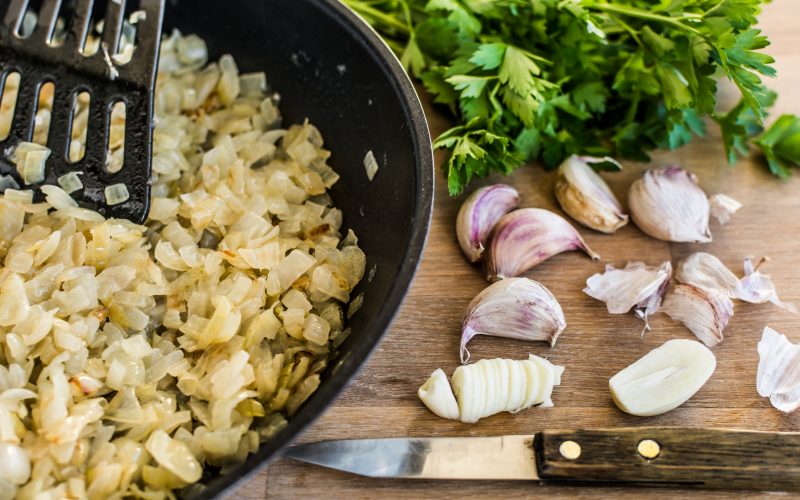Onions. They are the king of the United Federation of Flavor — the mascot that says to cooks and eaters everywhere, “Welcome to flavor city.” They also pack a potent punch if they aren’t processed correctly (and even when they are).
What gives these vital veggies their signature tastes and smells? And how can you get the best of their flavor? Let’s dive in.
The Secret to Flavor? Science.
Think about an onion. What does it taste like? What does it smell like? Here’s the thing: Whatever you answered, you’re probably right.
Onions come in hundreds of varieties. They can be sweet or sour, soft or crisp, tangy or dripping with umami. The intensity of an onion’s smell and flavor also depends on its freshness. If you’ve ever picked an onion fresh out of the soil, you may have been surprised to find it didn’t have a smell. So, what is going on?
Onions have a unique chemistry with molecules that contain a whole lot of sulphuric compounds. Sulphur is responsible for those pesky tears that pop up anytime you chop an onion, but it is also responsible for flavor and odor. The scientific name for this group of compounds is thiosulfinates.
But here’s the really interesting thing. A fresh, raw onion doesn’t have these molecules. They form after an onion is damaged, like when you chop, slice, or dice. Cutting an onion breaks up cell structure and releases the molecules. Enzymes come into contact with the molecules and create the thiosulfinates and their characteristically strong smell, all in 30 seconds or less.
How intense the smell and flavor of your onion is depends on its variety, or cultivar, and how much sulfur was in the soil. Spring onions harvested in the early spring tend to be more mild, while storage onions harvested in the late summer and early fall tend to be more pungent.
How Does Cooking Affect Onion Flavor?
How you prepare onions will affect the flavor. Since slicing and dicing releases the odor and flavor, the more finely you chop an onion, the more flavorful it will be. On the other hand, a process like boiling an onion will break down the enzymes that spur the chemical reactions creating a less pungent flavor.
Different levels of heat can control levels of flavor. Heat spurs a range of chemical reactions that all interact with the fundamental make-up of the onion. The longer the cooking time, the more mild and savory an onion becomes.
Caramelizing or sauteing onions on low or moderate heat causes a reaction between the sugars and the proteins. The onions turn brown, the sugars come free, and the sulphuric compounds react over and over until the pungent flavor is gone and the sweet sugar flavor remains.
The Gills Onions Promise
At Gills Onions, we are dedicated to creating onions that stay fresh longer and have the best flavor you can find. From the seeds we grow to the soil we grow them in to the way we slice and dice the onions, to the packaging we use to keep them safe until they arrive in your kitchen, flavor is always top of mind.
We hope you enjoy them.
Ready to try onions grown “The Gills Way”? Contact our sales department to learn more.

